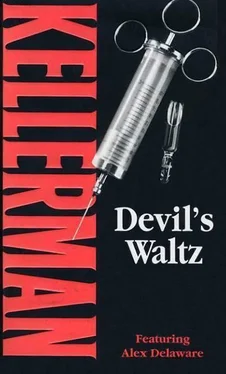“Did she actually get killed at this club?”
“I don’t know,” she said. “We really weren’t listening to the details, just wanted the cops to get her stuff out of here, get the whole thing out of our systems.”
“Do you remember the detective’s name?”
“Gomez,” they said in unison.
“Ray Gomez,” said Bobby. “He was a Los Lobos fan and he liked doo-wop. Not a bad guy.”
Ben nodded. Their knees were pressed up against each other, white from pressure.
“What a thing to happen,” she said. “Is this child going to suffer because Dawn stole the chart?”
“We can work around it,” I said. “It just would have been nice to have.”
“Shame,” said Ben. “Sorry we can’t help you. The police took all her stuff and I didn’t see any medical chart in there. Not that I was looking that close.”
“What about the things she stole?”
“No,” said Bobby, “no charts there, either. Not too thorough of the cops not to find it, huh? But let me just check, to make sure — maybe inside the flaps or something.”
She went into the kitchen and came back shortly with a shoebox and a strip of paper. “Empty — this here’s the picture she laid on top. Like she was staking her claim.”
I took the photo. One of those black-and-white, four-for-a-quarter self-portraits you get out of a bus terminal machine. Four versions of a face that had once been pretty, now padded with suet and marred by distrust. Straight dark hair, big dark eyes. Bruised eyes. I started to hand it back. Bobby said, “You keep it. I don’t want it.”
I took another look at the photo before pocketing it. Four identical poses, grim and watchful.
“Sad,” I said.
“Yeah,” said Bobby, “she never smiled much.”
“Maybe,” said Ben, “she left it at her office at the U — the chart, I mean.”
“Do you know what department she was in?”
“No, but she had an extension there that she gave us. Two-two-three-eight, right?”
“Think so,” said Bobby.
I took paper and pen out of my briefcase and copied that down. “She was a doctoral student?”
“That’s what she told us when she applied. Biomathematics, or something.”
“Did she ever mention her professor’s name?”
“She gave a name for a reference,” said Bobby, “but to tell the truth we never called it.”
Sheepish smile.
“Things were tight,” said Ben. “We wanted to get a tenant quickly, and she looked okay.”
“The only boss she ever talked about was the guy at the hospital — the one who got killed. But she never mentioned him by name.”
Ben nodded. “She didn’t like him much.”
“Why’s that?”
“I dunno. She never went into details — just said he was an asshole, really picky, and she was gonna quit. Then she did, back in February.”
“Did she get another job?”
“Not that she told us about,” said Bobby.
“Any idea how she paid her bills?”
“Nope, but she always had money to spend.”
Ben gave a sick smile.
Bobby said, “What?”
“Her and her boss. She hated him but now they’re both in the same boat. L.A. got ’em.”
Bobby shuddered and ate a muffin.
Learning about Dawn Herbert’s murder and her penchant for stealing got me thinking.
I’d assumed she’d pulled Chad’s chart for Laurence Ashmore. But what if she’d done it for herself because she’d learned something damaging to the Jones family and planned to profit from it?
And now she was dead.
I drove to the fish store, bought a forty-pound bag of koi food, and asked if I could use the phone to make a local call. The kid behind the counter thought for a while, looked at the total on the register, and said, “Over there,” pointing to an old black dial unit on the wall. Next to it was a big saltwater aquarium housing a small leopard shark. A couple of goldfish thrashed at the water’s surface. The shark glided peacefully. Its eyes were steady and blue, almost as pretty as Vicki Bottomley’s.
I called Parker Center. The man who answered said Milo wasn’t there and he didn’t know when he’d be back.
“Is this Charlie?” I said.
“No.”
Click.
I dialed Milo’s home number. The kid behind the counter was watching me. I smiled and gave him the one-minute index finger while listening to the rings.
Peggy Lee delivered the Blue Investigations pitch. I said, “Dawn Herbert was murdered in March. Probably March 9, somewhere downtown, near a punk music club. The investigating detective was named Ray Gomez. I should be at the hospital within an hour — you can have me paged if you want to talk about it.”
I hung up and started walking out. A froth of movement caught the corner of my eye and I turned toward the aquarium. Both the goldfish were gone.
The Hollywood part of Sunset was weekend-quiet. The banks and entertainment firms preceding Hospital Row were closed, and a scatter of poor families and drifters massaged the sidewalk. Auto traffic was thin — mostly weekend workers and tourists who’d gone too far past Vine. I made it to the gate of the doctors’ parking structure in less than half an hour. The lot was functioning again. Plenty of spaces.
Before heading up to the wards, I stopped at the cafeteria for coffee.
It was the tail end of lunch hour but the room was nearly empty. Dan Kornblatt was getting change from the cashier just as I stepped up to pay. The cardiologist was carrying a lidded plastic cup. Coffee had leaked out and was running down the cup’s sides in mud-colored rivulets. Kornblatt’s handlebars drooped and he looked preoccupied. He dropped the change in his pocket and saw me, gave a choppy nod.
“Hey, Dan. What’s up?”
My smile seemed to bother him. “Read the paper this morning?” he said.
“Actually,” I said, “I just skimmed.”
He squinted at me. Definitely peeved. I felt as if I’d gotten the wrong answer on an oral exam.
“What can I say,” he snapped, and walked away.
I paid for my coffee and wondered what in the paper was eating him. Looking around the cafeteria for a discarded paper, I failed to spot one. I took a couple of swallows of coffee, tossed the cup, and went to the library’s reading room. This time it was locked.
Chappy Ward was deserted and the door to every room but Cassie’s was open. Lights off, stripped beds, the tainted meadow smell of fresh deodorization. A man in yellow maintenance scrubs vacuumed the hallway. The piped-in music was something Viennese, slow and syrupy.
Vicki Bottomley sat at the nursing station reading a chart. Her cap sat slightly off-kilter.
I said, “Hi, anything new?”
She shook her head and held out the chart without looking up.
“Go ahead and finish it,” I said.
“Finished.” She waved the chart.
I took it but didn’t open it. Leaning against the counter, I said, “How’s Cassie feeling today?”
“Bit better.” Still no eye contact.
“When did she wake up?”
“Around nine.”
“Dad here yet?”
“It’s all in there,” she said, keeping her head down and pointing at the chart.
I flipped it open, turned to this morning’s pages, and read Al Macauley’s summary notes and those of the neurologist.
She picked up some kind of form and began to write.
“Cassie’s latest seizure,” I said, “sounds like it was a strong one.”
“Nothing I haven’t seen before.”
I put the chart down and just stood there. Finally she looked up. The blue eyes blinked rapidly.
“Have you seen lots of childhood epilepsy?” I said.
“Seen everything. Worked Onco. Took care of babies with brain tumors.” Shrug.
Читать дальше












